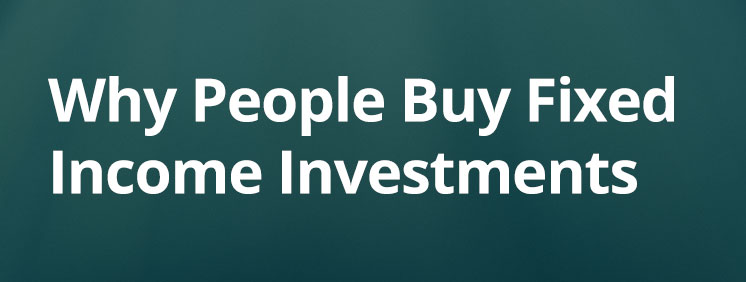
When many people hear the term investing, the first thing that comes to mind is the stock market. While stocks are a useful and popular investment vehicle, they’re far from the only investment option. Those looking to invest their money may choose from a wide variety of financial products, one of the most common of which is fixed-income investments. But what are fixed-income investments and why do people buy them? For those looking to invest in fixed income, it’s important to understand the answers to these key questions.
What is Fixed Income?
Fixed income is a type of investment where the payment the investor will receive is a fixed amount. The most common type of fixed income investment is bonds, issued either by the government or companies.
When a company or the government issues a bond, they are essentially asking investors to loan them money. This is similar to how an individual goes to the bank and asks for a mortgage loan. The difference is that in the case of the individual taking out a loan, the bank is the lender, while in the case of the bond, the investor is the lender. In both instances, the lender provides the borrower with capital, but in return, the borrower must pay the lender back with interest. The maturity date of fixed income is the point by which the borrower is required to have paid back all of the loans.
Types of Fixed Income
Bonds are the most common type of fixed-income investment, but there’s not just one type of bond. There are quite a few types. Some of the most popular include the following:
- Treasury Bills
- Treasury Notes
- Treasury Inflation-Protected Securities (TIPS)
- Municipal Bonds
- Corporate Bonds
- Junk Bonds
Other types of fixed-income investments include certificates of deposit (CDs), fixed income mutual funds (also known as bond funds), fixed income ETFs, and money markets. Preferred shares may also be considered fixed income since they’re a hybrid between an equity investment and a fixed income investment. Preferred shares offer a fixed dividend payment even though they’re technically an equity investment.
Advantages of Buying Fixed Income Investments
One of the biggest advantages of fixed-income investments is that fixed-income investors are paid before shareholders if a company goes bankrupt.
For example, let’s say there are two investors who both invest in Company XYZ. The first investor owns bonds issued by Company XYZ, while the second investor owns shares of stock issued by Company XYZ. Now let’s say Company XYZ files for bankruptcy. The company must first pay the investor who owns the bonds. If the company runs out of money, it’s possible that the second investor, who only owns stocks, could lose some or even all of the money they invested with Company XYZ.
This is part of the reason why fixed-income investments are considered a lower risk investment option. Though they still have some risk, as all investments do, since the income they provide is a fixed amount and companies that file for bankruptcy must typically pay their fixed-income investors first, fixed income comes with less risk than many other investment options.
Disadvantages of Buying Fixed Income Investments
When it comes to investing, there is a strong correlation between risk and reward. This correlation can be seen with fixed-income investments. As previously mentioned, fixed income comes with less risk, which is a big advantage for many investors, but it also comes with a lower chance for returns, which is one of its biggest disadvantages. Fixed income rarely has the kind of returns that higher-risk investments, such as stocks, may potentially have.
The good news is that investors are not limited to only one type of investment vehicle. In fact, for most people, a portfolio made up of various asset classes is preferable, since it provides more diversification.
Fixed Income’s Impact on the Economy
Fixed income investments are a key part of investing, but they don’t just benefit investors. Fixed income has a huge impact on the economy. At the heart of fixed income’s impact is the simple fact that it provides entities with a way in which to raise funds. This allows businesses to grow and expand, while also creating an opportunity for investors to earn money.
The Takeaway
When it comes to investing, the stock market often gets more of the attention, but fixed-income investments also play an important role for both individual investors, companies, the government, and the economy as a whole.
Related Courses: Fixed Income Professional Certificate
Develop a complete set of desk-ready skills for fixed income market participants. You will learn how to determine fair values, yields, and risk measures for a wide variety of instruments including government bonds, corporate bonds, mortgage securities, and fixed income derivatives. Understand the structure and trading conventions of fixed income markets, and learn how to construct, interpret, and trade the term structure of interest rates.
About The New York Institute of Finance
The New York Institute of Finance (NYIF) is a global leader in professional training for financial services and related industries. NYIF courses cover everything from investment banking, asset pricing, insurance and market structure to financial modeling, treasury operations, and accounting. The New York Institute of Finance has a faculty of industry leaders and offers a range of program delivery options, including self-study, online courses, and in-person classes. Founded by the New York Stock Exchange in 1922, NYIF has trained over 250,000 professionals online and in-class, in over 120 countries.
See all of NYIF’s training and qualifications here.





